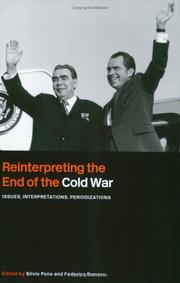| Listing 1 - 1 of 1 |
Sort by
|

ISBN: 0714684929 071465695X 0714656003 Year: 2005 Volume: 6 Publisher: London Cass
Abstract | Keywords | Export | Availability | Bookmark
 Loading...
Loading...Choose an application
- Reference Manager
- EndNote
- RefWorks (Direct export to RefWorks)
The history of the Cold War is being re-written according to the newly available sources. But first and foremost it needs to be re-conceptualized and framed within the broader historical context that transformed the Cold War from the 1960s onwards, altered the very dynamics of bipolarism, and eventually brought it to its end. The long duration and the unexpectedly peaceful ending of the Cold War call for new views that transcend the established paradigms about its inception. Historians ought to address all those transformations in the international economy, in the networks of interdependence linking together new areas - especially in Asia - and in the ensuing cultural images that gradually narrowed the relevance of bipolarism. Thus the habitual diplomatic and security themes must be enjoined with economic, ideological, technological and cultural ones. Here a distinguished group of international history specialists discusses the complex relationship between Cold War dynamics, the globalizing of capitalism, and the demise of Soviet Communism. Their controversial and conflicting views, as well as their multidisciplinary approaches, highlight the various factors that constituted (and did not constitute) the Cold War. Thus they help to redefine the concept itself, to map its values and limitations, and to propel historical debate onto new grounds.
World history --- anno 1900-1999 --- Cold War --- Guerre froide --- Congresses --- Congrès --- Communist countries --- Pays socialistes --- History --- Congresses. --- Histoire --- World politics --- #A0505HI --- -Iron curtain lands --- Russian satellites --- Second world (Communist countries) --- Soviet bloc --- Former communist countries --- World politics#A0505HICommunist countries --- Former communist countriesHistory --- -History --- Congrès --- Iron curtain lands
| Listing 1 - 1 of 1 |
Sort by
|

 Search
Search Feedback
Feedback About UniCat
About UniCat  Help
Help News
News